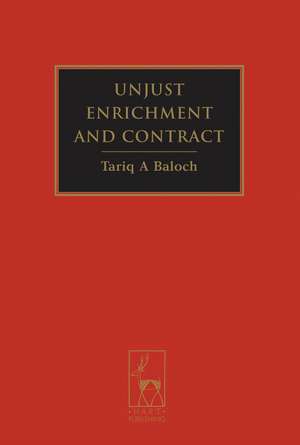Unjust Enrichment and Contract
Autor Tariq Balochen Limba Engleză Hardback – 11 mar 2009
Preț: 568.64 lei
Preț vechi: 815.87 lei
-30% Nou
Puncte Express: 853
Preț estimativ în valută:
108.81€ • 118.56$ • 91.69£
108.81€ • 118.56$ • 91.69£
Carte tipărită la comandă
Livrare economică 23 aprilie-07 mai
Preluare comenzi: 021 569.72.76
Specificații
ISBN-13: 9781841139081
ISBN-10: 1841139084
Pagini: 228
Dimensiuni: 156 x 234 x 18 mm
Greutate: 0.49 kg
Editura: Bloomsbury Publishing
Colecția Hart Publishing
Locul publicării:London, United Kingdom
ISBN-10: 1841139084
Pagini: 228
Dimensiuni: 156 x 234 x 18 mm
Greutate: 0.49 kg
Editura: Bloomsbury Publishing
Colecția Hart Publishing
Locul publicării:London, United Kingdom
Caracteristici
This book examines the role of unjust enrichment in the contractual context, defined as contracts which are (a) terminated for breach, or (b) subsisting, or (c) unenforceable.
Notă biografică
Tariq A Baloch is an Associate within the International Arbitration Group of Freshfields Bruckhaus Deringer in Paris; he was formerly a Lecturer in Laws at the London School of Economics and Political Science, where he is currently a Visiting Fellow.
Cuprins
Introduction 1. An Historical Analysis of the Independence of Unjust Enrichment III. Introduction II. Myth, Mystery and Illusion A. The Two Senses of 'Contract': a Source of Rights and as a Method of Classification B. Procedure and the Development of Indebitatus Claims III. Development of the Law before Moses v Macferlan A. Holt CJ and Indebitatus Claims B. Role of Equity in the Development of the Law C. Encouraging Indebitatus Claims IV. Lord Mansfield's Decision in Moses v Macferlan V. The Period After Moses v Macferlan A. Case Law B. Legal Discourse VI. Learning from the Past: Concluding Comments 2. Rejecting the Role of Unjust Enrichment in the Contractual Context I. Introduction II. A Critical Appraisal of the Three Models A. Kull and the Third Restatement of Restitution B. Hedley C. Jaffey III. Conclusion 3. What is the Best Organisation for the Law of Unjust Enrichment: Unjust Factors or Absence of Basis? I. Introduction II. New Birksian Approach A. Objective and Subjective Tests of 'Basis' B. Notion of Basis C. Greater Unity III. The Pyramid A. Wrong reasons: the Swaps Cases B. Wrong Basis: CTN Cash and Carry v Gallaher C. Clashing Obligations: Roxborough v Rothmans of Pall Mall Australia Ltd D. Enhancing Choice: Deutsche Morgan Grenfell v Inland Revenue Commissioners IV. Three Criticisms of the New Birksian Approach A. By-Benefits B. Negative Formulation C. Retrospectivity of Termination V. Conclusion 4. The Role of Unjust Enrichment in the Contractual Context: an Introduction to Chapters 5 and 6 I. Background II. The Model Proposed in this Book III. Overview of Chapters 5 and 6 5. Historical Foundations of the Modern Law of Unjust Enrichment in the Contractual Context I. Introduction II. Evolution of the Dominant Model A. Background: Independency B. Antecedents of Kingston and Boone C. The Boone Principle in Detail D. Reception of Boone and Establishment of the Dominant Model III. Rescission and Total Failure of Consideration A. Total Failure of Consideration B. Rescission IV. Apportioned Contracts and Quantum Meruit A. Apportioned Contracts B. Quantum Meruit V. Conclusion 6. The True Role of Unjust Enrichment in the Contractual Context I. Introduction II. Core Principles A. Meaning of 'Condition' B. A Qualifying Failure of Condition C. Accrued Rights D. Prevention III. Distinctiveness of Quantum Meruit A. Infringing the Freedom of Choice B. Entire Contracts C. Valuation IV. Unenforceable Contracts and Claims by the Party in Breach. V. Failure of Condition and Absence of Basis VI. Restitution upon Failure of Condition: Contract or Unjust Enrichment? VII. Conclusion Conclusion
Recenzii
This monograph is easy to recommend to those interested in the relationship of restitution and contract. There is much to admire in the historical depth and analytical clarity that the author has brought to this subject.
The questions this book addresses ... are fundamental and it marks a clear and important advance on orthodox accounts of law in this area. All those interested in contract law, unjust enrichment and legal history have much to take from it.
This monograph constitutes a new star in the every expanding galaxy of enrichment literature, and it is a star which shines brightly.Beyond the practical exposition of restitution alongside breach of contract, Dr Baloch makes important claims with respect to the general nature of unjust enrichment in English law, and indeed the historical development of the law. It is to be hoped that some of the protagonists in the field will engage with its important thesis.
The questions this book addresses ... are fundamental and it marks a clear and important advance on orthodox accounts of law in this area. All those interested in contract law, unjust enrichment and legal history have much to take from it.
This monograph constitutes a new star in the every expanding galaxy of enrichment literature, and it is a star which shines brightly.Beyond the practical exposition of restitution alongside breach of contract, Dr Baloch makes important claims with respect to the general nature of unjust enrichment in English law, and indeed the historical development of the law. It is to be hoped that some of the protagonists in the field will engage with its important thesis.
Descriere
This book examines unjust enrichment's role in the contractual context, or contracts which are terminated for breach, subsisting, or unenforceable.
